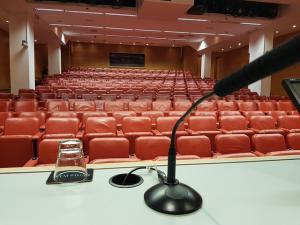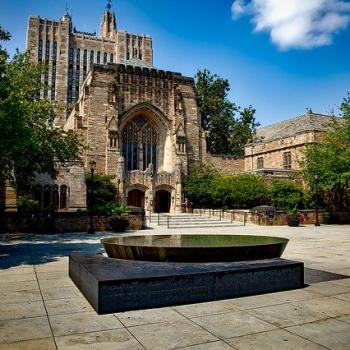 A few days ago, I had the pleasure of listening to a fascinating discussion/debate between Villanova University professors Mary Hirschfeld and Eugene McCarraher. Both have written excellent books on the intersection of Christian faith and economics: Hirschfeld, who holds dual Ph.D. degrees in economics and theology, lays out a Thomistic approach to mainline economics in Aquinas and the Market: Toward a Humane Economy, while McCarraher argues for a Romanticism-inflected socialism in his monumental The Enchantments of Mammon: How Capitalism Became the Religion of Modernity.
A few days ago, I had the pleasure of listening to a fascinating discussion/debate between Villanova University professors Mary Hirschfeld and Eugene McCarraher. Both have written excellent books on the intersection of Christian faith and economics: Hirschfeld, who holds dual Ph.D. degrees in economics and theology, lays out a Thomistic approach to mainline economics in Aquinas and the Market: Toward a Humane Economy, while McCarraher argues for a Romanticism-inflected socialism in his monumental The Enchantments of Mammon: How Capitalism Became the Religion of Modernity.
While their general assessments of capitalism sharply diverge, what struck me most was the remarkable fruitfulness of their conversation. I’ve read (and enjoyed) both of their books, and I can honestly say my understanding of their respective positions was meaningfully deepened—I now know where Hirschfeld would intervene in market processes to promote human flourishing, and where McCarraher’s ideal future would diverge from socialist stereotypes.
Normally, I hate panel discussions with a passion. I find them tedious, dull, and almost always unconstructive. This one was different, and I think it was so good because of what Hirschfeld and McCarraher had in common—namely, their shared Catholic faith, which both of them clearly took very seriously.
This leads me to think that there’s a valuable lesson here for confessional education in general. Faith-based schools are often maligned in the secular press for their perceived narrowness of thought, their refusal to expand students’ intellectual horizons. And while I was attending my small Christian college, I’m ashamed to say there were plenty of times when I thought similar things. I wanted to hear “the other side” of any perspective a guest speaker advanced in a lecture or that a professor said in class.
It took me altogether too long to realize the impulse driving me to crave “the other side” wasn’t actually intellectual curiosity, but rather a kind of status anxiety vis-à-vis other schools. Out of a misplaced (if understandable) desire to not be thought weird, I wanted our college to be more like all the other fancy institutions my friends attended, full of eccentric and shocking ideas and arguments. If I’d actually cared about engaging alternative perspectives, they were all readily available online.
It increasingly seems to me that real progress in thought occurs against a backdrop of common moral and intellectual commitments. Arguments over incommensurable first principles certainly have their place, but that can’t be the be-all end-all of the educational process. To progress in knowledge there needs to be a shared foundation of some sort. (You won’t learn very much about ancient Egypt if you never move beyond arguing that the aliens built the pyramids.)
The most interesting conversations tend to take place not between people who are diametrically opposed, but by people who start from shared premises and reach sharply differing conclusions (and the more premises they share, the more progress can be made). Discussants who spend the entire conversation trying to spark reactions or score points (as is too often the case—just consider the obnoxious Ken Ham/Bill Nye debate) aren’t helping anyone advance their knowledge of the subject area, but are simply pandering to their base.
Viewed from this angle, the “statements of faith” that many confessional schools require students and faculty to sign aren’t arbitrary limitations on research or free thought. Instead, they’re the core axioms from which reasoning proceeds and within which good discussions can take place. (If one doesn’t agree with those axioms, one need not attend the institution—else, one will simply end up miserable and frustrated.) And one might even go a step further: at least confessional schools are up frontabout their faith commitments, as opposed to cloaking them in the shroud of “institutional principles” and “mission statements.” After all, “secular” institutions are no less axiom-driven than their faith-based counterparts (the only real question is what the axioms will be).
Here’s hoping for more debates like Hirschfeld/McCarraher. And if anyone reading this happens to be enrolled at a confessional institution: savor the experience and appreciate the opportunity.












